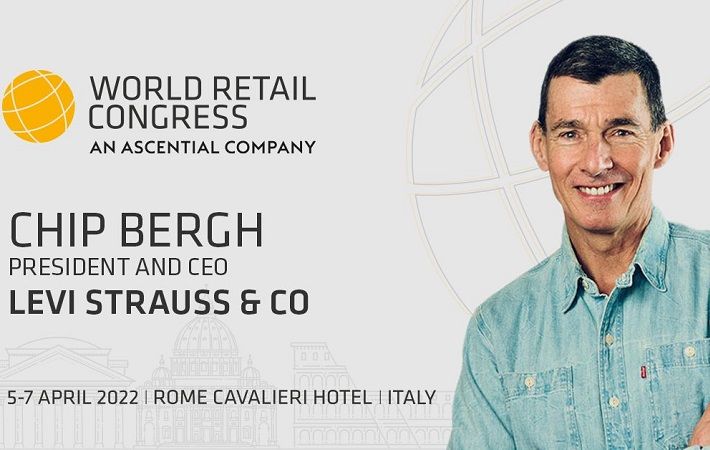Levi Strauss' Chip Bergh lists trends shaping global retail landscape

Bergh also admitted that ‘deprioritising’ diversity and inclusion in the early days was his biggest mistake and regret of his time with the company. But he now insisted it was embedded in the company’s culture.
His comments came in a wide-ranging interview with Susan Hart, co-Leader, Global Retail Practice at the executive search firm Spencer Stuart, who work with boards and CEO’s on leadership and helped Levi’s hire Bergh after a 28-year career at Procter & Gamble.
Bergh told her that three of the four major trends had been accelerated by the pandemic whilst the most recent – rising costs and inflation – was going to have a big impact on the industry.
On sustainability he said: “It is no secret that the apparel industry is a bad guy when it comes to planet earth. A lot of our products end up in landfill and that’s not good. We also use a lot of chemicals, we use a lot of water, all of these are putting stress on the planet.”
He said that the 169-year-old business, which trades in 110 countries worldwide, was working flat out to reduce its environmental footprint, using fibres such as hemp, that are more sustainable and looking for ways to reduce water usage.
“Sustainability has been a strategic issue for us. We weave it into everything we do. We drive our innovation programme around sustainability. Sustainability used to be pretty niche from a consumer standpoint and very Europe-centric. Now it’s truly global and cuts across generations. The young consumer in particular is really focused on this. If you ask a teenager today they will very likely say climate change is top of mind in terms of their concerns,” he added.
On digital technology, he warned that companies which failed to adopt it would simply die. Digital was more than simply e-commerce and had the power to alter everything from product design to supply chains ‘dramatically simplifying’ how business is done.
“With the pandemic everybody’s stores shut down and everybody did the hard pivot to e-commerce but when I say the rapid move to digitisation its more than e-commerce and building out those digital capabilities for the consumer. There’s so much of our business that can be digitised everything from how we design product to how we manage getting product to store. All of that can be digitised and take out time and touches, dramatically simplify the business is done,” Bergh said.
He said: “If you are not a tech company today, you are going to be dead in 10 years’ time. We are an apparel company, but we are quickly becoming a tech company.”
On supply chains, he said he believed “globalisation is dead” and companies would increasingly look to produce goods closer to the markets in which they traded. This was better for the environment but also made good commercial sense.
He said: “Our industry has traditionally chased the lowest-cost manufacturing base around the world but this is coming to an end. The name of the game today is supply chain resilience and agility. When you are losing sales because a ship is stuck outside a port and can’t unload, and you are leaving money on the table because consumers can’t buy your products that is a big issue.
“We’re going to see more manufacturing shifting closer to market because of the importance of that agility and responsiveness and having confidence that the product is going to be on the shelf in store when you need it to be.”
On rising cost pressures and inflation, he said some of this was being driven by the pandemic, some of it by supply chain bottlenecks and some by shortages of labour in some parts of the world.
“There is no question that we are seeing our costs going up, everybody is, and that is going to have an impact on our business,” he said.
Turning to diversity, equity and inclusion, he acknowledged that the brutal truth was that huge inequalities remained, particularly in the US. He also admitted regretting not to have moved sooner and faster to foster the diverse and inclusive culture that Levi advocates today.
He further said: “When I joined the company 10 years ago, the house was on fire, the company had nearly gone bankrupt a couple of years earlier. The brand was stagnating, we weren’t growing, profits were pretty terrible. It was a business turnaround and when we were developing the strategy the idea of focusing on diversity and inclusion came up, but I deprioritised it.
“Looking back, it was one of the biggest mistakes I made in my 10 years here as, in my heart and soul, I believe that a diverse organisation will outperform a homogenous one every time.”
Fibre2Fashion News Desk (KD)
































-Ltd..jpg?tr=w-120,h-60,c-at_max,cm-pad_resize,bg-ffffff)





.jpg?tr=w-120,h-60,c-at_max,cm-pad_resize,bg-ffffff)
.jpg?tr=w-120,h-60,c-at_max,cm-pad_resize,bg-ffffff)






